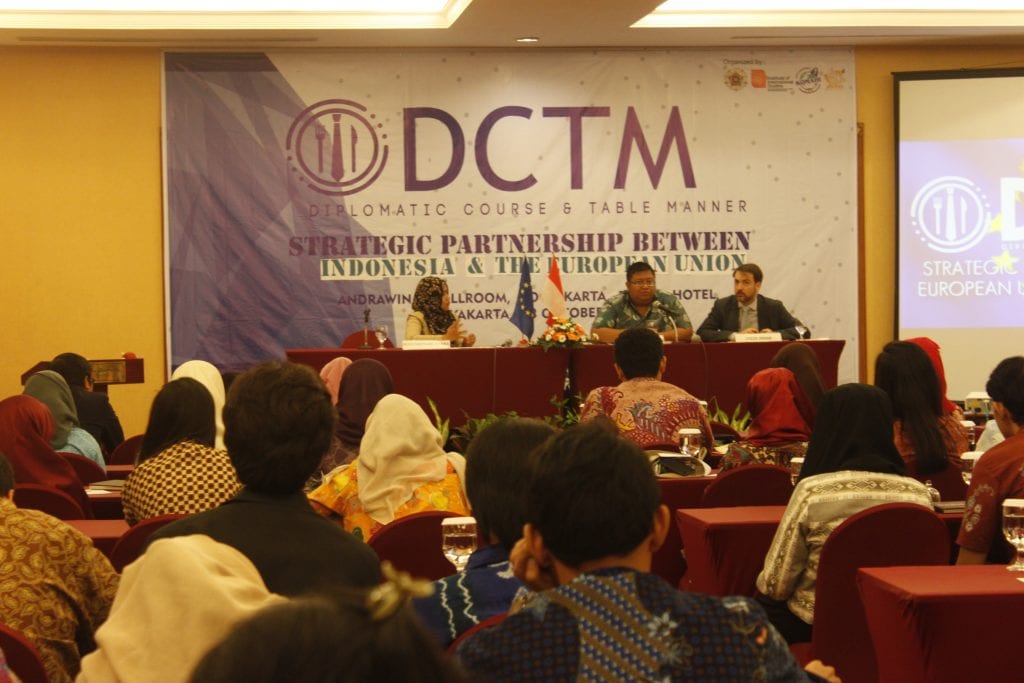Today is the D-day. After more than five months of preparation, finally the Diplomatic Course and Table Manner (DCTM), which is the annual event presented by KOMAHI UGM,has begun. The main theme of DCTM for this year is “Strategic Partnership between Indonesia and the European Union”. The DCTM contains four events held in three days, starts from 1st of October until 3rd of October 2015.
There are two events held on the first day. The first event is seminar on ‘Indonesia – European Union Bilateral Relations Update’, starts from 09.00 a.m. until 11.45 a.m.. We are so glad that this seminar can invite two important people from Ministry of Foreign Affairs and Delegation of European Union for Indonesia and Brunei Darussalam as speakers, while Suci Lestari Yuana from Department of International Relations UGM acts as the facilitator. Respectively, the Ministry of Foreign Affairs is represented by Rio Budi Rahmanto as the Deputy Director for Indonesia – European Union Cooperation and the European Union is represented by Julio Arias as the Chargé d’Affaires a.i. Delegation of the European Union to Indonesia and Brunei Darussalam.
Seminar on Indonesia-EU Bilateral Relations Update presents the current updates on EU-Indonesiabilateral relations. Both European Union and Indonesia had a politicaltransformation last year. The newleadership in European Union and Indonesia shares the same vision to enhance and deepen cooperationbetween both of them. Particularly in this seminar, both speakers put the same interest in the crude palm oil (CPO) issue, which has been one of major cases that build the bridge between Indonesia and the EU.
As in the seminar, Julio Arias says that Indonesia and the EU naturally have good grounds economically, since export on commodities is complimentary to each other. “There is a huge potential between Indonesia and the EU in economic and trade relations. Naturally, our commodities compliment to each other. In the case of the crude palm oil,the tariff’s line is not so high. CPO is more on consumer’s perspective in the EU. Therefore, it is not directly that the government could intervene. What we can do is to facilitate the business”, says Arias.
Meanwhile, Rio explains that we still have standardization problem, particularly in tariff, industrial standard – market preference, and ISPO – market-driven certification Indonesian Standardization Palm Oil (ISPO). “In terms of fisheries, Indonesia now has Setifikasi Hak Tangkap Ikan (SHTI) which is based on EU laws. How strong is ourbargaining power? –if we look at the statistic, the import ofthe EU is quite limited, while EU is one of the main import partners of Indonesia. So, it becomes less favourable for us. Nevertheless, we are now trying to accelerate and strive to increase trade and investment”, says Rio. He added that Schengen Visa exemption, for short-term visits, is seen as one way to increase Indonesia’s chance in playing bigger role in the bilateral exchange of goods with the EU. This visibility will be discussed in EU Council this October. This is also believedto give more opportunities for business from both parties to set up cooperation.
After the lunch break, the second event, soft launching of “Politik dan Pemerintahan Uni Eropa” textbook, is started from 13.30 p.m. until 14.30 p.m.. This session mainly talks about the list of contents of the textbook which have been writtenby Indonesian Community for European Studies (ICES) scholars. The bookcomprehensively explores the political system within EU: how the EU Pillars(Council, Commission, and Parliament) work, how societal actors cancontribute to the political life, and some salient issues in the EU such as deficitdemocracy, political representation, identity and common fisheries policy.
As the representatives of the writers, there are Suci Lestari Yuana and Muhadi Sugiono, who is also one of two editors of the book, explaining a brief description of each chapter. Since this is only the soft launching, Suci and Muhadi open a wide space for the participants to give their comments and insights on the spot as reader candidates towards the book that is going to be launched firmly in the next year. From the feedback and active discussion in this session, it seems that the participants, who are mainly still in Senior High School and junior year of college, are fairly excited to read the book since it is indeed aimed to be read by ‘the starters’ who want to get to know about the EU in general.
The rest of the events, which are Model European Union (MEU) and Table Manner Course, will be held in the next two days.
Edited by: Maylany Ika Putri



